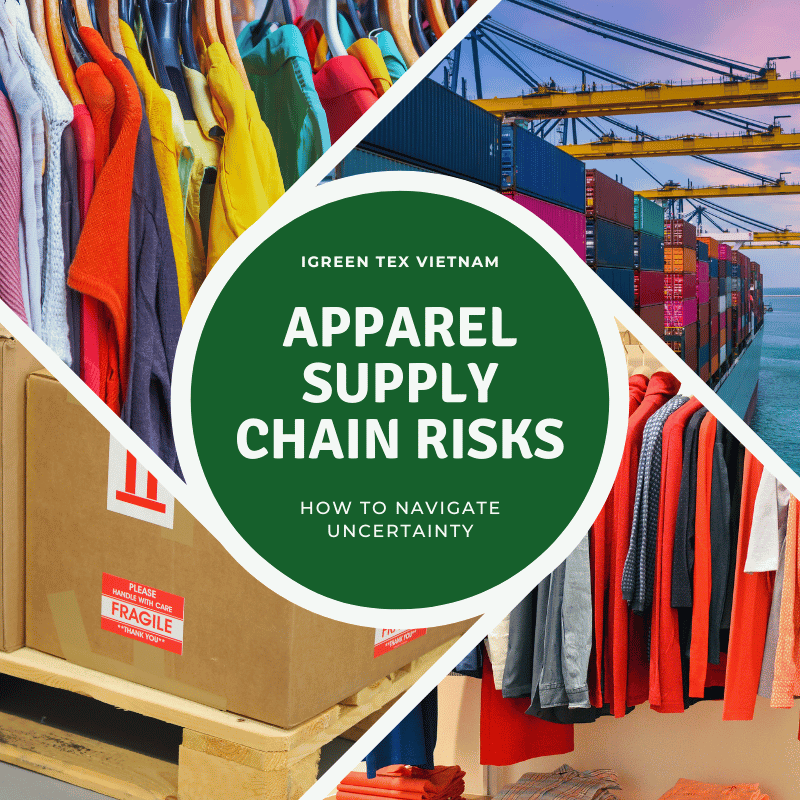- Navigating Uncertainty: Why Your Traditional Apparel Supply Chain Can’t Withstand Global Shocks
Navigating Uncertainty: Why Your Traditional Apparel Supply Chain Can’t Withstand Global Shocks
The global apparel landscape has fundamentally shifted. Old, familiar ways of doing business are crumbling. Brands face immense, unprecedented pressures. Traditional supply chains are proving too fragile. They lack the resilience needed today. They cannot cope with modern disruptions. Understanding inherent Apparel Supply Chain Risks is now critical. It is no longer an optional consideration.

Recent global events have provided stark lessons. A widespread pandemic halted factories. It crippled logistics networks overnight. Geopolitical tensions surged across continents. Climate change brought devastating natural disasters. These events collectively exposed deep weaknesses. Many companies relied on outdated operating models. They focused solely on simple cost minimization. This singular focus overlooked emerging new risks. It led to severe, cascading consequences. Production delays became the norm. Operational costs escalated dramatically. Brand reputations suffered significantly.
Apparel buyers and brand owners now realize this truth. Their existing supply chains are simply too brittle. They are prone to sudden, catastrophic failures. This leads to critical production stoppages. It results in missed market deadlines. It severely impacts their ability to compete. Furthermore, intense pressure for sustainability is mounting. Consumers demand greater transparency. Regulations enforce more responsible practices. This scrutiny applies to the entire supply chain.

They are no longer just seeking any manufacturer. They need a true strategic partner. A partner capable of navigating this growing complexity. They need help building a stable supply chain. This chain must be transparent. It must also be demonstrably sustainable. This deep transformation requires a clear understanding of Apparel Supply Chain Risks.
At IGREEN TEX VIETNAM, we grasp this core need. We see beyond mere production volume. We are a dedicated manufacturing partner. We transform your unique apparel concepts. We bring these visions to life with utmost precision. Our unwavering focus remains on excellence. We consistently serve discerning international brands. Our production capabilities are vast and versatile. We meet the most stringent global standards. Our commitment to quality is absolute. Visit www.igreentex.com to discover more. Our successful exports to demanding markets prove our capabilities. We serve nations like the US, UK, France, and Japan. These markets accept nothing less than perfection.
See more: Standard Casual Clothing Manufacturer for the U.S. Market
See more: Vietnam Clothing Exporters: 1 Comparing with Other Countries
See more: Our Comprehensive Apparel Manufacturing Capabilities in Vietnam
See more: The Production Process of Modal Fabrics
See more: S.Café® Fabrics – New Innovation of Recycle Spinning Funtionality of Fabric
See more: Corn Fiber: Properties, Manufacturing, Benefits and Uses
The Unseen Fragility: Hidden Apparel Supply Chain Risks Now Exposed
Many global apparel buyers continue to operate. They use business models from a different era. These models were designed for predictability. They optimized solely for basic cost efficiency. They often ignored newly emerging threats. They may not fully comprehend the extent. The inherent fragility of their own supply chain is real. It is acutely vulnerable to external shocks. These shocks can be utterly devastating.
The world is undeniably transforming at speed. Traditional apparel supply chains now face unprecedented challenges. They confront risks previously unseen. It is imperative to fundamentally rethink sourcing strategies. Ignoring these new realities is extremely dangerous. It places your entire business in jeopardy. Recognizing escalating Apparel Supply Chain Risks is the essential first step. This awareness is foundational. It sets the stage for vital change.
Geopolitical Turmoil: A Shifting Global Landscape
Geopolitical events now exert profound influence on commerce. Trade wars can erupt with little warning. Tariffs can change overnight. Regional conflicts can cause major disruptions. These factors create immense Apparel Supply Chain Risks. They make long-term planning incredibly difficult. Factories might face unexpected closures. Critical shipping routes can become impassable.

Consider the severe impact of sudden sanctions. A key raw material source might become inaccessible. Vital supply lines can face immediate restrictions. This leads to swift material shortages. It causes significant, costly production delays. Prices for alternative sourcing often surge steeply. This widespread unpredictability creates deep instability. It significantly adds to the overall Apparel Supply Chain Risks.
Companies must now actively consider diversification. Relying on a single manufacturing region is simply too risky. Political instability in one country can completely cripple production. This forces a rapid re-evaluation of all partners. It means urgently seeking out stable, dependable alternatives. Proactive management of these Apparel Supply Chain Risksis paramount for business continuity.
Climate Change & Natural Disasters: Unpredictable Disruptions
The profound effects of climate change are now undeniable. Extreme weather events are occurring more frequently. Severe floods, droughts, and storms disrupt operations globally. Natural disasters can completely halt production. They damage essential infrastructure. They cut off critical access to raw materials. This creates substantial, ever-increasing Apparel Supply Chain Risks.
Take, for example, a major regional flood. It can submerge an entire factory. It can devastate crops crucial for natural fibers. This leads to sudden, widespread material scarcity. It causes all production lines to cease operation. Supply chains become extremely vulnerable to these repeated shocks. Recovery efforts can often take many months. These events are now a regular part of strategic planning. They critically amplify existing Apparel Supply Chain Risks.
Brands must build inherent resilience. They need robust strategies for adaptation. Diversifying geographic manufacturing locations helps significantly. Investing in localized supply bases can mitigate impact. Preparing meticulously for the unpredictable is vital. It is a fundamental part of managing modern Apparel Supply Chain Risks.
Economic Volatility: Inflation, Recession, & Currency Swings
Global economies are demonstrating increasing volatility. Persistent inflation can rapidly erode profit margins. Economic recessions directly impact consumer spending power. Unpredictable currency fluctuations make pricing highly uncertain. These factors add significant, multifaceted Apparel Supply Chain Risks. They make accurate financial planning an absolute nightmare.

A sudden, sharp currency depreciation, for instance, impacts costs immediately. Imported raw materials become instantly more expensive. Exported goods might yield significantly less revenue. This makes future pricing extremely difficult to forecast. It directly affects overall profitability. Economic instability demands highly agile financial management. It critically increases Apparel Supply Chain Risks for every player.
Brands urgently need manufacturing partners who understand. They need partners who can adapt to these swift shifts. Strategies for hedging and dynamic pricing become essential. A deep understanding of global economic trends is key. It helps significantly in mitigating these widespread Apparel Supply Chain Risks.
Evolving Consumer & Regulatory Pressures: Beyond Price Alone
Today’s discerning consumers demand far more than low prices. They insist on full transparency. They actively seek ethical sourcing practices. They genuinely care about sustainability. Brands now face immense pressure from all sides. They must publicly demonstrate responsible operations. This scrutiny applies rigorously across their entire supply chain. Failing here creates massive Apparel Supply Chain Risks for hard-earned reputation.
New regulations are constantly emerging worldwide. These laws extensively cover environmental impact. They address fair labor practices. They mandate detailed traceability. Non-compliance can lead to severe financial penalties. It can cause irreparable brand damage. Greenwashing is no longer tolerated by consumers. Authenticity and genuine action are crucial for brand survival. This growing public scrutiny defines an entirely new category of Apparel Supply Chain Risks.
Companies must deeply embed sustainability. It cannot be an afterthought strategy. It must be an integral part of all operations. Partnering with demonstrably responsible manufacturers is vital. It ensures long-term business viability. It actively helps in navigating these complex Apparel Supply Chain Risks.
Technological Disruptions & Cybersecurity: New Vulnerabilities
Technology certainly brings unprecedented efficiency. Yet, it also introduces a whole new realm of Apparel Supply Chain Risks. Cybersecurity threats are an ever-present danger. Malicious data breaches can compromise sensitive information. Critical operational systems can be attacked. This can halt production completely. It can severely disrupt logistics.
Automation is rapidly changing industry workflows. Adapting to new technologies is absolutely key. But it also presents complex integration challenges. Older, legacy systems can be particularly vulnerable. Investing in robust, secure IT infrastructure is crucial. Protecting valuable intellectual property is paramount. These pervasive digital threats are a rapidly growing concern. They significantly add to complex Apparel Supply Chain Risks.
Brands must remain highly vigilant. They need to implement robust IT security protocols. They require resilient, redundant digital systems. Partnering with technologically aware factories helps immensely. It actively mitigates these modern, evolving Apparel Supply Chain Risks.
The Illusion of Stability: Why Traditional Models Now Fail
For several decades, many prominent brands focused almost purely on cost. They sourced predominantly from a single, low-cost region. This seemingly efficient strategy often overlooked bigger picture Apparel Supply Chain Risks. It inadvertently created a false sense of security. The immediate benefits appeared to be high profit margins. The underlying, inherent fragility was conveniently ignored.
These deeply traditional supply chain models were built for predictability. They fundamentally assumed stable geopolitical environments. They expected consistent, uninterrupted economic growth. Crucially, they did not account for extreme, widespread weather events. They certainly did not predict sudden global pandemics. When these core assumptions broke, the entire old model shattered. This catastrophic failure exposed critical Apparel Supply Chain Risks for all to see.
The single-source model is inherently vulnerable. If that one factory faces any problem, everything immediately stops. There is no viable backup plan in place. There is no accessible alternative. This fundamental lack of diversification is a huge, critical flaw. It is a major contributor to widespread Apparel Supply Chain Risks.
Furthermore, transparency was frequently lacking. Brands knew very little about their sub-suppliers. They had extremely limited visibility into labor conditions. This created numerous hidden ethical and social risks. The absence of robust, independent oversight led to severe problems. These issues often surfaced publicly. They impacted brand image negatively. This situation starkly highlighted new, significant Apparel Supply Chain Risks.
Relying solely on outdated metrics is now dangerous. Just looking at the unit cost is no longer enough. The true cost calculation now includes potential disruptions. It includes severe reputation damage. It covers valuable missed market opportunities. These hidden, intangible costs are often immense. They clearly underscore the true scale of modern Apparel Supply Chain Risks.
The escalating pressure from conscious consumers compounds this. They increasingly demand to know the full story behind products. They insist on transparent, ethical sourcing. They expect verifiable sustainable practices. Brands cannot hide behind complex, opaque supply chains any longer. This intense pressure adds yet another layer of complexity. It fundamentally emphasizes the urgent need to address all Apparel Supply Chain Risks.
It is no longer simply about making clothes cheaper. It is now about making them responsibly. It is about making them resiliently. It is about making them reliably. The entire paradigm has fundamentally shifted. Adapting swiftly to this new reality is absolutely essential. Ignoring it will inevitably lead to business failure. This is the new, challenging landscape of Apparel Supply Chain Risks.
Rethinking Sourcing: A Call for Agility & Resilience
The current global climate demands a radically new approach. Passive acceptance of escalating Apparel Supply Chain Risks is no longer an option. Brands must actively build intrinsic flexibility. They need to create enduring resilience within their entire operations. This proactive, forward-looking stance is the only viable path forward. It ensures long-term business survival and growth.
Agility in this context means responsiveness. It implies the crucial ability to adapt quickly and effectively. This involves strategically shifting production locations. It means rapidly finding alternative qualified suppliers. It requires streamlined, decisive decision-making processes. An agile supply chain can pivot swiftly. It can competently navigate unexpected changes. It effectively mitigates many latent Apparel Supply Chain Risks.
Resilience, on the other hand, means fundamental robustness. It implies the inherent capacity to absorb severe shocks. It means bouncing back rapidly from any disruptions. This involves building redundancy into sourcing. It requires fostering strong, collaborative relationships with partners. A truly resilient supply chain minimizes costly downtime. It ensures the continuous flow of essential goods. This is crucial for effectively managing complex Apparel Supply Chain Risks.
Building this powerful new paradigm requires a strategic, holistic mindset. It moves far beyond simple cost-cutting exercises. It actively prioritizes comprehensive risk mitigation. It focuses intently on long-term stability. It fully embraces deep-seated sustainability. This fundamental shift is utterly vital for sustained success. It transforms the very way we view pervasive Apparel Supply Chain Risks.
It means rethinking supplier relationships completely. It means moving decisively from purely transactional interactions to genuine partnerships. A true partner actively helps you navigate difficult challenges. They proactively offer innovative solutions. They consistently contribute to operational stability. They genuinely share your long-term vision. This collaborative approach significantly strengthens operations. It dramatically reduces various Apparel Supply Chain Risks.
This new era also demands absolute transparency. Brands must possess full, comprehensive visibility. They need to see clearly into their entire supply chain. This includes precise raw material origins. It covers all labor conditions. It encompasses environmental practices. Transparency actively builds essential trust. It mitigates critical ethical Apparel Supply Chain Risks.
Investing strategically in technology is also key. Advanced data analytics can predict looming disruptions. Blockchain technology can significantly enhance traceability. Automation can vastly improve overall efficiency. Technology helps create truly smart supply chains. These sophisticated systems can react much faster. They can plan far more effectively. They reduce many complex Apparel Supply Chain Risks.
For brands earnestly seeking stability and reliability, Vietnam offers compelling solutions. Its rapidly evolving manufacturing landscape provides incredible opportunities. It actively helps build robust, adaptable supply chains. Partners like IGREEN TEX VIETNAM are at the forefront of this evolution. They deeply understand these global complexities. They actively help brands navigate challenging Apparel Supply Chain Risks.
The Path Forward: From Vulnerability to Strength
The realization of systemic Apparel Supply Chain Risks can certainly feel daunting. However, it also presents an extraordinary opportunity. It is a rare chance to rebuild systems stronger than before. It is an opportunity to create more ethical frameworks. It is time to establish truly sustainable, resilient operations. This transformative journey starts with clear awareness. It begins with a thorough understanding of underlying problems.
The key message is now unmistakably clear: The world is transforming at an unprecedented pace. Traditional apparel supply chains are confronting risks never before seen. It is imperative to fundamentally rethink your entire sourcing strategy. This isn’t merely about short-term survival. It’s about securing a powerful competitive advantage. It’s about definitively future-proofing your invaluable brand. It’s about proactively mitigating looming Apparel Supply Chain Risks.
Your brand’s long-term future critically depends on this shift. The crucial ability to build an agile, responsive supply chain is paramount. It absolutely ensures your fundamental resilience. It secures your competitive position in complex global markets. This is no longer a mere strategic option. It is a core, undeniable business imperative.
At IGREEN TEX VIETNAM, we understand these challenges intimately. We recognize the rapidly evolving landscape. We are fully aware of the immense pressures you face. Our extensive experience in serving demanding global markets speaks volumes. We consistently deliver exceptional quality to clients in the US, UK, France, and Japan. This success clearly demonstrates our unwavering commitment. It undeniably shows our proven capability. We have successfully navigated these complexities for years. We actively help brands effectively manage their Apparel Supply Chain Risks.
We are here to strongly support your transformative journey. We enthusiastically advocate for a bold new approach. One built firmly on genuine partnership and inherent resilience. One deeply focused on absolute transparency and responsible ethical practices. This is the future of apparel sourcing. This is precisely how you effectively address critical Apparel Supply Chain Risks.
It’s time to move decisively beyond reactive measures. It’s time to build a proactive, robust strategy. It’s time to secure your vital supply chain’s future. Explore exciting new possibilities. Embrace strategic, forward-thinking decisions. Effectively mitigate your inherent Apparel Supply Chain Risks.
Visit our website today: www.igreentex.com. Explore our comprehensive portfolio. Learn more about our unique, proactive approach. Send us an inquiry without hesitation. Let us clearly demonstrate our unwavering commitment to quality. Let us show our proven ability to consistently deliver. We are highly confident in our extensive Apparel Supply Chain Risks management capabilities. We are ready to become your trusted, long-term manufacturing partner.
We eagerly look forward to collaborating with you. Let IGREEN TEX VIETNAM help you achieve your ambitious apparel production goals. Experience manufacturing excellence. Rely on a partner who truly understands your evolving needs. Choose superior Apparel Supply Chain Risks management and manufacturing capabilities in Vietnam.
About IGREEN TEX
IGREEN TEX is a provider of fashion and textile products, offering a wide range of both domestically and internationally. Our commitment to quality ensures that our products not only meet the highest standards but also promote eco-friendly practices, in Vietnam sportswear manufacturing.
If you want to read more information about canvas bags, you can see it here!!!
To view product information click here
Visit our website to learn more about our products and services: IGREEN TEX
IGREEN TEX VIETNAM CO LTD
Address: No. 6 – 6A, D52 Street, Ward 12, Tan Binh Dist, HCMC
E-mail: info@igreentex.com
WhatsApp/Viber/Zalo: +84 938.045.900




